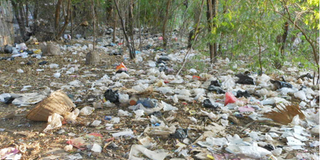Plastic waste ravages Handeni district raising health concerns

What you need to know:
- The used polyethylene materials, often dumped haphazardly in various places, have also turned into an eyesore
Dar es Salaam. Plastic waste is increasingly becoming a menace and a health hazard in Handeni town and its environs.
The used polyethylene materials, often dumped haphazardly in various places, have also turned into an eyesore.
Residents in the district headquarters, in particular, want the issue addressed by the relevant authorities.
"A lot of effort is needed by all the stakeholders," said Ms Elizabeth Mbughuni, an official of an NGO called Two Seeds.
According to her, about 90 percent of the solid waste dumped at the bus terminals in the district is non-biodegradable plastic.
This is particularly evident at the Segera bus station along the Dar es Salaam-Arusha highway, where there is a significant volume of vehicle traffic.
The dumped plastics would remain on the roadsides for months and maintain the same form for years even after they were buried, making them non-biodegradable.
"When it rains, they are buried underground. But they will remain the same plastics as they cannot decompose," she said.
Ms Mbughuni challenged the single-use bag manufacturers to stop making plastic bags because of their negative effects on the environment.
She said plastic waste is now common not only in urban centres but also in remote villages across the country.
They can be reduced if the manufacturers opt for the production of alternative bags, specifically using the paper material.
A veterinary expert, Abdulnassir Haule, said the polyethylene posed a threat to the livestock as they could feed on it.
"Because they cannot be chewed and break down, they will interfere with the digestive system of the animals, eventually killing them," he said.
The dumped plastics also posed a threat to soil health, and if left uncollected for safe disposal, they could impact the growth of crops.
Tanzania banned single-use plastic bags in June 2019.
All types of plastics were banned from being imported, exported, manufactured, sold, stored, supplied or used in Mainland Tanzania. Special desks were designated at border posts and airports for travellers entering the country to surrender their plastic bags.
Following this, the government released a notice for travellers wishing to visit the country that all plastic carriers, "regardless of their thickness," will be prohibited.
Visitors from abroad arriving in the country with plastic bags saw them confiscated by Customs and Immigration officials.
The strict government initiative was expected to cut down on plastic waste in the country and to help preserve the natural beauty of Tanzania.
Tanzania was not the first African country to take a step towards removing plastic bags.
It followed other countries such as Rwanda, Kenya, Mali, Cameroon, Uganda, Ethiopia, Malawi, Morocco, South Africa and Botswana.
The ten countries and others across the continent had since years ago either banned plastic bags completely or now charge a tax on them.
The plastic waste issue for African countries is serious. In some countries, the landscapes around the cities had been littered with dumped plastic.
Globally, so far, 65 countries have imposed bans and another 31 countries impose a tax per bag.


